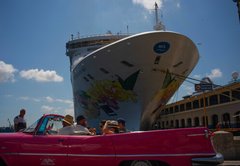Reverse Barack Obama's Cuba policy
Donald Trump
“The president’s one-sided deal for Cuba and with Cuba benefits only the Castro regime but all the concessions that Barack Obama has granted the Castro Regime was done through executive order, which means they can be undone and that is what I intend to do unless the Castro Regime meets our demands.”
Trump-O-Meter

Promise Kept

